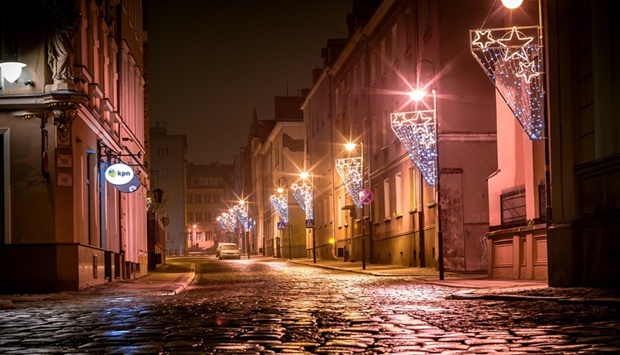• No lockdown before Christmas: Germany
• Clash after Belgian Covid measures protest
Dutch urban centres were largely deserted yesterday as the country began a snap lockdown that, aimed at stemming an expected coronavirus (Covid-19) surge caused by the fast-spreading Omicron variant, left people’s Christmas plans in disarray.
Prime Minister Mark Rutte announced the shutdown on Saturday evening, ordering the closure of all but essential stores, as well as restaurants, hairdressers, gyms, museums and other public places until at least January 14.
In Rotterdam, police used a water cannon to disperse a group of around 1,000 people who had gathered outside the city’s main soccer stadium, ahead of a clash between local team Feyenoord and bitter rivals Ajax Amsterdam.
Several people were held as fireworks and bottles were thrown at police and at the Ajax team bus, news agency ANP said.
Spectators have been barred from Dutch sporting events since the end of November.
The new curbs, which also include a ban on gatherings outside of more than two people, were unexpected, and many people rushed out on Saturday to stock up on presents or get a last-minute festive haircut.
Hospitality workers demanded compensation for lost income over the holiday season.
“Closing all bars and restaurants in such an important month is incredibly painful and dramatic. We need compensation and an exit strategy,” the Dutch association for hospitality services said.
Dutch coronavirus infections have dropped from record levels after a night-time lockdown came into force last month.
However, Omicron cases are increasing rapidly and the variant is expected to become dominant before the end of the year.
Hospitals have already been cancelling regular operations for weeks as they try to avoid running out of beds because of the high numbers of Covid-19 patients.
The government also said on Saturday that it would accelerate its booster vaccine programme.
More than 85% of Dutch adults are double-vaccinated, fewer than 9% have had a booster shot, one of the lowest rates in western Europe.
Germany’s health minister Karl Lauterbach has meanwhile ruled out a Christmas lockdown, but warned that a fifth Covid-19 wave could no longer be stopped and backed mandatory vaccination as the only way to stop the pandemic.
“There will not be a lockdown before Christmas here. But we will get a fifth wave – we have crossed a critical number of Omicron infections,” Lauterbach said, speaking on broadcaster ARD, adding: “This wave can no longer be completely stopped.”
In another interview with Bild, Lauterbach added that he did not expect there to be a “hard lockdown” after the holidays either.
Germany banned unvaccinated people from entering non-essential establishments at the beginning of the month in an attempt to control rising cases amid the spread of the Omicron variant.
The government still needed to make clear to the populace what would and would not be allowed during the holiday season, Lauterbach said, without specifying what measures were under discussion.
The government’s scientific advisory panel said in a statement yesterday that it is necessary to limit contact between people further, with data so far showing that boosters alone would not be enough to contain the spread of the virus.
Given how quickly and widely the Omicron variant disperses – with Omicron cases doubling every 2-4 days in Germany at present, slower than the UK’s growth rate but faster than the spread of other variants in Germany – a considerable overload of hospitals was to be expected, the statement said.
Nearly 70% of the population is fully vaccinated against the virus, according to data from December 17.
The country reported 29,348 new cases yesterday and 180 deaths, according to the Robert Koch Institute for infectious diseases.
The number of new daily cases rose significantly in October and November but have been slowly falling since the start of the month.
Lauterbach reiterated his call to make vaccination compulsory in yesterday’s interview with ARD, a policy which parliament is due to debate early next year and which Chancellor Olaf Scholz has said he supports.
“I believe we can defeat this if we close the gaps in vaccination with mandatory vaccines. That is my clear conviction,” Lauterbach said.
In Belgium, police intervened to disperse stone-throwing youths yesterday after the latest protest march in Brussels against anti-coronavirus measures.
The crowd that marched from the Gare du Nord railway to a park in the city’s European quarter was smaller than in two previous protests – around 3,500 people, according to the police.
However, a smaller number of mainly young, black-clad and hooded protesters clashed with riot officers protecting the route to EU headquarters, where officials were meeting African leaders.
Belgium is recording around 10,000 new Covid-19 cases per day as the Omicron variant spreads in Europe, and authorities have again begun to tighten public health rules.
Prime Minister Alexander De Croo’s government will meet on Wednesday to decide on any new measures.
Belgium has run a relatively successful vaccine campaign and has begun issuing booster shots, but a vocal minority is wary of compulsory jabs and certificates or opposes lockdown measures.
The stone- and bottle-throwers were dispersed back into the Jubilee Park by charges by riot police, and plain clothes officers made several arrests, an AFP journalist saw.

(Representative photo) Dutch urban centres were largely deserted yesterday as the country began a snap lockdown that, aimed at stemming an expected coronavirus (Covid-19) surge caused by the fast-spreading Omicron variant, left people’s Christmas plans in disarray. Photo: Pixabay.
